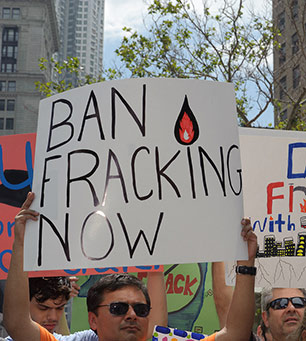What kind of community fracking bans make sense?
Federal and state governments largely have embraced the oil-and-gas boom sparked by hydraulic fracturing. Fracking is a key part of Obama’s “all of the above” energy strategy. States such as Texas have long touted its economic benefits, while the candidates for governor in Pennsylvania have moved the debate past the question of whether to frack to the question of how to make the most money from it.
But fracking looks different to the places hosting gas wells, pipelines and compressor stations. At the local level, it transforms from a matter of energy policy to a matter of land-use policy as it leaves the abstract realm of commodity and enters the lived place of community. Fracking brings jobs, but it also brings hazardous industrial activities that are uniquely invasive, because they feed on minerals regardless of what lies above them – even when it is neighborhoods, public parks, playgrounds or schools. The fact that the surface estate is subservient to the mineral estate makes it difficult for local governments to protect the health and safety of their citizens and to ensure compatibility of neighboring land uses.
In the face of such challenges, an increasing number of towns and cities have decided to ban fracking. Indeed, municipal bans have become the hottest flash point in the jurisdictional battle over the authority to write the rules for fracking. Much will depend on whether they can survive legal tests of pre-emption and regulatory takings.
Proponents of local bans often justify them on the basis of rights, especially the right of local self-determination. This framing makes intuitive sense – if a well is planned near your home or your child’s school, you have a right to be involved in that decision.
But the idea of local self-determination is riddled with quandaries. Modern cities are not that “local” to begin with; they are made possible by materials harvested from around the world. This position of utter dependence makes any appeal to “self-determination” problematic. Can cities in the age of globalization exercise sovereignty over energy systems?
A look at the actual language of several municipal fracking bans further muddies the assessment. Many cities have adopted a “community rights” approach. This often involves lofty prose about the various rights possessed by residents of a city. Here is a typical excerpt from the recently passed fracking ban in Lafayette, Colorado:
All residents and ecosystems in the City of Lafayette possess a fundamental and unalienable right to breathe air untainted by toxins, carcinogens, particulates, nucleotides, hydrocarbons and other substances introduced into the environment.
But wouldn’t this outlaw just about everything? Wouldn’t it make operating a weed whacker a human rights violation? The same language can be found in this ban about a right to clean water, which would seem to make it illegal to fertilize your lawn. In short, how does this ban target only fracking rather than the entirety of the modern human condition?
There are other problems with the community-rights language. For example, the Lafayette ban states that the municipal corporation is subordinate to “the people” “in all respects at all times.” At the very least this seems like a rebuke of representative government. But it also implies a kind of anarchy – if I am “the people,” then I don’t have to obey that school zone speed limit? Couldn’t I even drill for gas?
The phrase “tilting at windmills,” from Don Quixote, often is used to describe courses of action based on misplaced heroic, romantic or idealistic justifications. With their strong community rights bans, many towns and cities seem to be tilting at gas wells.
This is not to say there are no good justifications for fracking bans. The town of Dryden, New York, for example, banned fracking because this industrial activity is incompatible with its rural character. And its ban has survived two court battles without the flowery rights language.
Bans also can work in cities that have other industries. Pittsburgh, the first city to ban fracking, uses some rights-based language. It leans more heavily, though, on an appeal to the police powers of municipalities to protect public health, safety and welfare. And the crux of its argument is the following: “meaningful regulatory limitations and prohibitions concerning natural gas extraction, along with zoning and land use provisions, are barred because they conflict with certain legal powers claimed by resource extraction corporations.” In other words, Pittsburgh is justified in singling out this industry for special treatment, because it is already treated as a special case by state and federal laws.
The most artful way to ban fracking is to not ban it, that is, not overtly. The city of Southlake in Texas has such a strict ordinance that the industry had to pack up its rigs and leave. Strangulation by regulation creates a de facto ban, which is much more difficult for the industry to fight, because the city can rightly claim that it welcomes oil and gas development … as long as it is conducted according to the city’s terms. To write such an ordinance takes cunning and moxy. But when it is done well, it can show that the most effective way to defend community rights is to not mention rights at all.
Join us in defending the truth before it’s too late
The future of independent journalism is uncertain, and the consequences of losing it are too grave to ignore. To ensure Truthout remains safe, strong, and free, we need to raise $22,000 by the end of today. Every dollar raised goes directly toward the costs of producing news you can trust.
Please give what you can — because by supporting us with a tax-deductible donation, you’re not just preserving a source of news, you’re helping to safeguard what’s left of our democracy.
